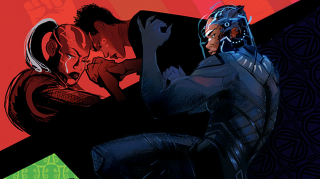In Wakanda and Beyond, Black Queerness Should Matter
By Marchaé Grair
When I first heard that Black Panther creators decided to cut a scene that would have resulted in black queer representation in the film, I didn’t think much of it. I convinced myself that the voices of the “representation pragmatists” were right.
The collective wisdom of these folks was “not everything has to be gay.” They argued that if Blackness, specifically feminist Black liberation, is centered in a blockbuster film, queer Black folks should be able to rejoice in the moment and not be bothered by the lack of representation of our experience.
As a black queer woman, this notion that I will “get my turn” if I patiently wait for representation is unfortunately pretty familiar. When I am in mainstream feminist spaces and say that #BlackLivesMatter, I’m told I’m being divisive and that we need to focus on “all women” right now. When I am in LGBTQ+ spaces and call out the erasure of Black queer and trans folks, people say “it’s not about race” right now.
When I express disappointment that Black Panther creators passed on a chance to queer the fierce, female warriors called the Dora Milaje, I’m disheartened by internet chastisement from folks saying there are enough queer, Black characters in film without any appearing in Black Panther.
Conveniently, these folks don’t want to discuss the comic series spinoff of Black Panther, “World of Wakanda,” where two of the Dora Milaje are in a romantic relationship. (In Marvel’s film version of Black Panther, one of those characters, Aneka, doesn’t appear. A scene where the other character in the relationship, Ayo, flirts with another guard named Okoye, was cut from the film.) People also scoff as queer folks point out that the erasure of that queer relationship isn’t just an erasure of fictional characters, but erasure of Roxane Gay, the brilliant queer feminist who wrote the spinoff “World of Wakanda” series.
As the “not every story has to be about you,” theme became more pervasive in response to queer Black folks questioning queer erasure in Black Panther, I almost believed it. I almost believed Disney being behind the film was enough reason to erase queer folks—after all, how could we dare expect a company that makes films for wholesome families to affirm the experiences of the queer children and families inevitably in the audience?
I almost believed the presence of queer, Black folks in movies like Moonlight meant that a call for representation in Black Panther was excessive—how could queer folks be selfish enough to want to be represented in movies that aren’t particularly about wrestling with gender identity or sexual orientation?
Internalized oppression would have me believe there is a hierarchy for oppressed groups that informs who gets to call for representation first, and if my intersections challenge that hierarchy, I am the problem. But the real problem is society’s struggle to be truly intersectional.
Internalized queer antagonism would have me believe the celebration of representation happening for Black folks in this Black Panther moment is only something that the Black part of me deserves yet the queer part of me doesn’t.
Internalized oppression is one hell of a drug I’m no longer taking.
I have decided I will not buy into the narrative that my call for representation is selfish, and I will join the chorus of Black queer folks who say no more.
If we keep our calls for queer representation and Black representation separate, it encourages an unhealthy compartmentalization of identity. This compartmentalization encourages us to think we must push for representation in isolation, giving us no room to ask when it will be our turn to push for representation that reflects the full breadth of our humanity. It’s time to stop putting the burden on Black queer folks to stop asking about our representation and push for a world where our lives are so safe and our identities are so honored that questions about representation are nonexistent.
